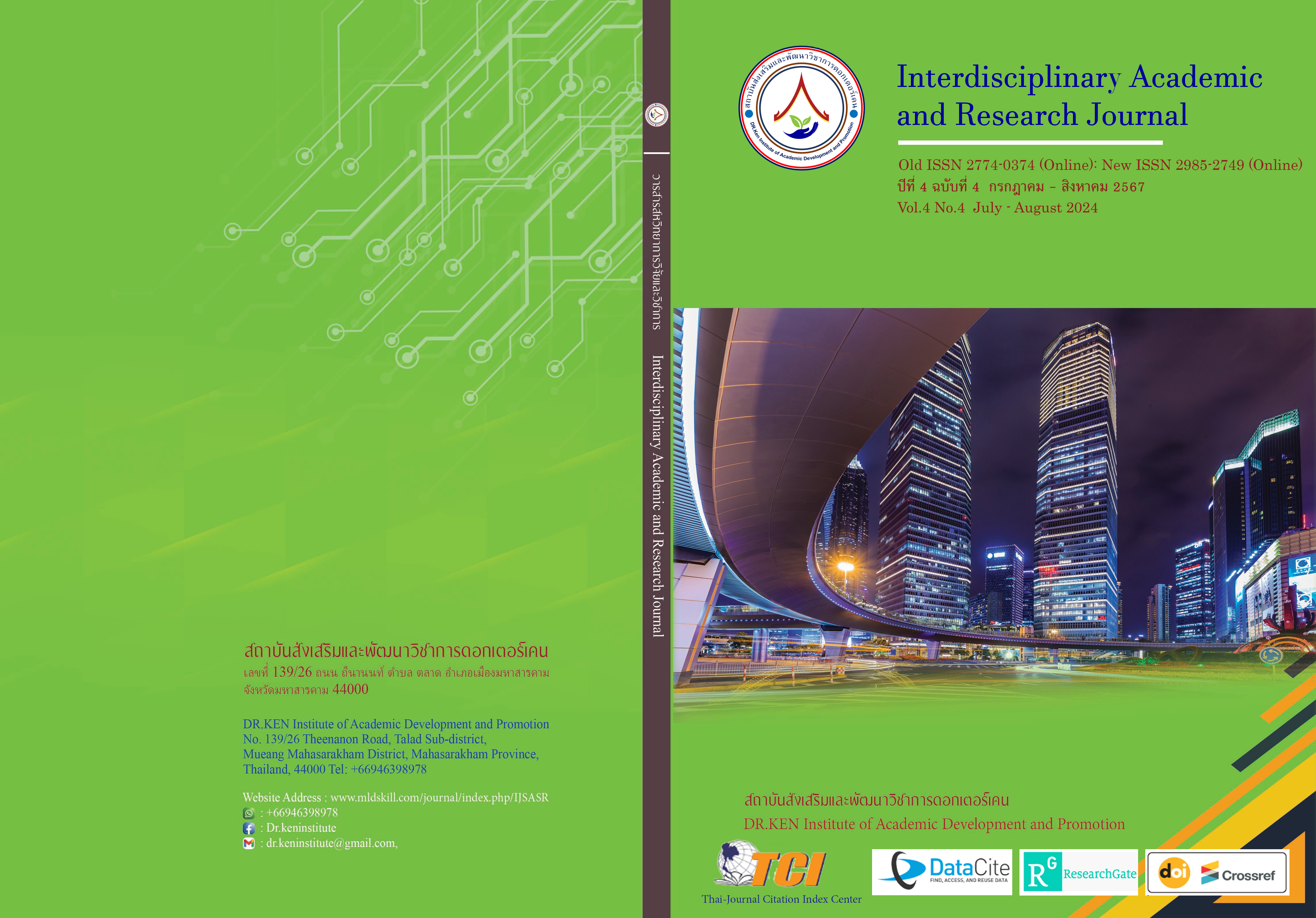Development of Learning Media Applications using a Smartphone
DOI:
https://doi.org/10.60027/iarj.2024.276522Keywords:
Application;, Smartphones; , Learning MediaAbstract
Background and objectives: Learning management that is consistent with learning in the 21st century requires designing teaching methods so that teachers, the teaching process, and the learning process are related. The use of smartphones is a teaching medium and packages of programs are packaged into smartphone applications. It is another method that is widely used today. The objectives of this research are: 1) to develop a learning media application Using a smartphone 2) to evaluate the quality of learning media applications using the developed smartphone 3) to assess user satisfaction with the learning media application Using the developed smartphone.
Research methods: The tools used are 1) learning media applications. using a smartphone in this research, the researcher has a 5-step process which consists of the Analysis stage (Analysis), program design stage (Design), development stage (Development), experiment stage (Implementation), evaluation stage (Evaluation) 2) Quality assessment form for learning media applications on devices. Move The evaluation of the application was divided into 2 aspects: technical quality and content of the application by 3 experts and 3) a user satisfaction questionnaire of 60 people. The sample group was General science students Faculty of Education and Human Development Statistics used mean and standard deviation.
Research results: The research results showed that 1) learning media applications were obtained. using a smartphone 2) learning media applications using a smartphone technical quality and content of the application Overall it is at a high level. And 3) users are satisfied with the learning media application. using a smartphone Overall it is at a high level.
Conclusion: Development of learning media applications using a smartphone It is the development of teaching media in the form of a smartphone application. Having content to understand the work can help to have more skills in learning science. Application quality analysis results Evaluated by 3 experts it was found that the quality assessment results were at a high level. Results of satisfaction assessment of learning media applications using a smartphone Overall, it is at a high level.
References
Almelhi, A.M. (2021). Effectiveness of the ADDIE Model within an E-Learning Environment in Developing Creative Writing in EFL Students. English Language Teaching, 14(2), 20-36. DOI:10.5539/elt.v14n2p20
Chongthanomwiwat, N., Kaewchan, T., & Ittisan, P. (2022). Development of an Android smartphone application to assess the elderly according to their ability to perform daily activities for public health personnel at Sub-district Health Promotion Hospitals in Sai Noi District, Nonthaburi Province. Journal of Health Science of Thailand, 31(5), 851–859. Retrieved from https://thaidj.org/index.php/JHS/article/view/12787
Dawn, G., & David, G. (2021). Head First Android Development: O'Reilly Media, Inc..
DiMarzio, J. (2016). Beginning Android programming with Android Studio. John Wiley & Sons.
Esezi, O. (2023). Convenience and purposive sampling techniques: Are they the same? International Journal of Innovative Social & Science Education Research, 11(1), 1-7.
Felder, R. M., & Silverman, L. K. (1988). Learning and teaching styles in engineering education. Engineering Education, 78(7), 674-681.
Gee, J. P. (2003). What video games have to teach us about learning and literacy. Computers in Entertainment (CIE), 1(1), 20-20.
Huang, H. M. (2002). Toward constructivism for adult learners in online learning environments. British Journal of Educational Technology, 33(1), 27-37.
Kozma, R. B. (1991). Learning with media. Review of Educational Research, 61(2), 179-211.
Liu, Y., Han, S., Li, H., & Wong, L. H. (2011). Effects of guidance in a discovery‐based mobile learning environment on the learning achievements, motivation, and attitudes of students. British Journal of Educational Technology, 42(4), 573-588.
Mayer, R. E. (2009). Multimedia learning (2nd ed.). Cambridge University Press.
Nonthawasi, D., Misuwan, W., & Thiamkaeo, A. (2014). Development of learning applications on the Android operating system, A case study for Mathayomsuksa 4 students at Tha Khum Ngoen Wittayakhan School, Lamphun Province. Master’s thesis: Khon Kaen University
Nurbekova, Z., Grinshkun, V., Aimicheva, G., Nurbekov, B., & Tuenbaeva, K. (2020). Project-Based Learning Approach for Teaching Mobile Application Development Using Visualization Technology. International Journal of Emerging Technologies in Learning (iJET), 15(8), 130–143. https://doi.org/10.3991/ijet.v15i08.12335
Phakdee, T., & Lekdee, A. (2017). Development of a basic ASEAN language vocabulary application on the Android operating system. 3rd National Conference on Technology and Innovation Management NCTIM 2017.
Sawannarat, A., & Pumin, I. (2018). The Development of English Vocabulary Applications Multimedia Formatson Android Operating System. Wicha Journal, Nakhon Si Thammarat Rajabhat University, 37(S), 54-64.
Sueaprae, K., & Lohakarn, M. (2014). Developing learning applications in the Android operating system for studying digital image processing. For the Bachelor of Industrial Education program. Paper presented at the 7th National Industrial Education Conference, King Mongkut's University of Technology North Bangkok.
Suwanno, P. (2020). Developing applications for learning Educational research course on the Android operating system For 4th-year students at Yala Rajabhat University. E-Journal of Media Innovation and Creative Education, 3(1), 38-49.
Thompson, W. W., & Lee, J. J. (2012). Experiences of learning and engagement in educational virtual worlds. International Journal of Virtual and Personal Learning Environments (IJVPLE), 3(3), 18-30.
Vicharn, P. (2015). How to create learning for students in the 21st century. Journal of Learning Innovations Walailak University, 1(2), 3-14.
Zulherman, Gufron, A., Ariyadi, P., Baskoro, A. G., & Supriansyah, S. (2021). Development of android-based millealab virtual reality media in natural science learning. Journal Pendidikan Sains Indonesia (Indonesian Journal of Science Education), 9(1), 1-10. DOI: https://doi.org/10.24815/jpsi.v9i1.18218
Downloads
Published
How to Cite
Issue
Section
License
Copyright (c) 2024 Interdisciplinary Academic and Research Journal

This work is licensed under a Creative Commons Attribution-NonCommercial-NoDerivatives 4.0 International License.
Copyright on any article in the Interdisciplinary Academic and Research Journal is retained by the author(s) under the under the Creative Commons Attribution-NonCommercial-NoDerivatives 4.0 International License. Permission to use text, content, images, etc. of publication. Any user to read, download, copy, distribute, print, search, or link to the full texts of articles, crawl them for indexing, pass them as data to software, or use them for any other lawful purpose. But do not use it for commercial use or with the intent to benefit any business.
















.png)


